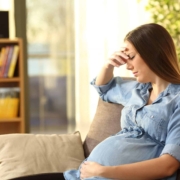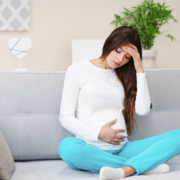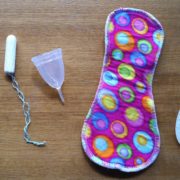Anxiety During Pregnancy
What is Anxiety?
Anxiety is feelings of worry, stress, or fear, and is a normal part of life. Anxiety is not only part of being pregnant, it’s part of being human. We all worry, and pregnancy can often amplify those worries. Antenatal anxiety is a very common experience. More than 1 in 10 women experience anxiety at some point during their pregnancy.
Pregnancy can be an incredibly wonderful time in your life, as well as a very scary time in your life. Pregnancy brings a mix of feelings, and not all of them are good. Your whole life as well as your body is going through a number of changes. These changes can be especially anxiety-provoking if this is your first pregnancy. You want everything to go perfectly, but you find yourself struggling with an array of worries and fears about every possible thing that could go wrong. If you’re feeling worried, you’re not alone. Worry is common, especially during a woman’s first pregnancy or an unplanned one. It can be even harder if you’re dealing with depression or anxiety. The more you think about those things, the worse your anxiety becomes.
What causes anxiety during pregnancy?
Pregnancy is also a time of tremendous change and hormonal changes during pregnancy may affect the chemicals in your brain. This can cause anxiety. After all, not everything that makes you feel anxious is under your control. Some of these feelings and sensations are welcomed, while others are downright uncomfortable and scary. You may even have complications or other issues that arise that keep you up at night.
What Are Some Symptoms of Anxiety During Pregnancy?
Since there are different types of anxiety disorders, the symptoms vary. Speak with your doctor about any symptoms you experience so he or she can accurately diagnose and treat you. Some common symptoms of anxiety disorders include:
- feeling an uncontrollable sense of anxiousness
- worrying excessively about things, especially your health or baby
- feeling irritable or agitated
- having tense muscles
- Feeling nervous, anxious or on edge frequently
- Finding it difficult or impossible to relax
- Feeling restless and hard to stay still
- Feeling afraid, or thinking that bad things will happen
- Inability to concentrate
- Difficulty sleeping
Things You Can Do to Manage Your Anxiety
- Avoid Scary Stories and Images
- Stop Thinking of “What Ifs”
- Meditate
- Deep-breathing exercises
- Avoid Stress
- Find a release
- Talk about it
- Rest up
Treatment for Anxiety During Pregnancy
- Counseling or therapy
- Support groups
- Medication
- Other approaches
- Exercise
- Eating a healthy diet
- Get enough sleep
- Meditate and breathe
When to See a Doctor?
Even if you experience only mild symptoms of anxiety, it is important to inform your doctor. If your anxiety is affecting your daily life or if you’re having frequent panic attacks, you should call your doctor right away. Only they can diagnose you with an anxiety disorder and recommend the best, most effective treatment options for you. Seeking help is the best step you can take to ensure that you and your child stay safe and healthy. The sooner you get help, the sooner you’ll be able to gain peace of mind for your health and the health of your growing baby.
Always remember; Take care of yourself as much as you can, for your and your baby’s health. Be sure to eat well, exercise, get enough sleep, and take your prenatal vitamins. Look for ways to reduce your stress.
Disclaimer
The information, including but not limited to, text, graphics, images and other material contained on this website are for informational purposes only. The purpose of this website is to promote broad consumer understanding and knowledge of various health topics. It is not intended to be a substitute for professional medical advice, diagnosis, or treatment. Always seek the advice of your physician or another qualified healthcare provider with any questions you may have regarding a medical condition or treatment and before undertaking a new health care regimen, and never disregard professional medical advice or delay in seeking it because of something you have read on this website.
References:
https://www.healthline.com/health/pregnancy/anxiety-coping-tips#treatment





